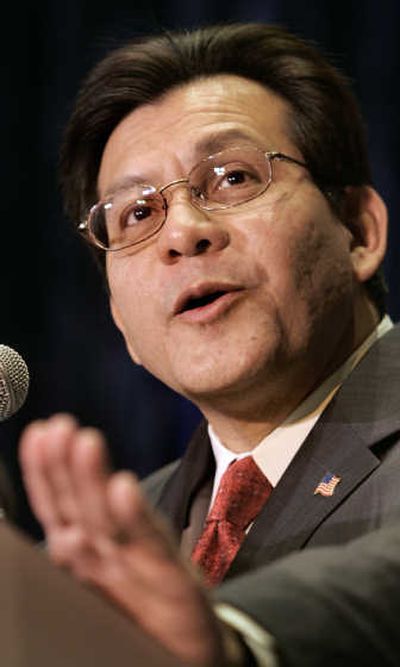Gonzales knew of FBI abuses, documents say

WASHINGTON – As he sought to renew the USA Patriot Act two years ago, Attorney General Alberto R. Gonzales assured lawmakers that the FBI had not abused its potent new terrorism-fighting powers. “There has not been one verified case of civil liberties abuse,” Gonzales told senators on April 27, 2005.
Six days earlier, the FBI sent Gonzales a copy of a report that said its agents had obtained personal information that they were not entitled to have. It was one of at least half a dozen reports of legal or procedural violations that Gonzales received in the three months before he made his statement to the Senate Intelligence Committee, according to internal FBI documents released under the Freedom of Information Act.
The acts recounted in the FBI reports included unauthorized surveillance, an illegal property search and a case in which an Internet firm improperly turned over a compact disc with data that the FBI was not entitled to collect, the documents show. Gonzales was copied on each report that said administrative rules or laws protecting civil liberties and privacy had been violated.
The reports also alerted Gonzales in 2005 to problems with the FBI’s use of an anti-terrorism tool known as national security letters (NSLs), well before the Justice Department’s inspector general brought widespread abuse of the letters in 2004 and 2005 to light in a stinging report this past March.
Justice officials said they could not immediately determine whether Gonzales read any of the FBI reports in 2005 and 2006 because the officials who processed them were not available Monday. But department spokesman Brian Roehrkasse said that when Gonzales testified, he was speaking “in the context” of reports by the department’s inspector general before this year that found no misconduct or specific civil liberties abuses related to the Patriot Act.
“The statements from the attorney general are consistent with statements from other officials at the FBI and the department,” Roehrkasse said. He added that many of the violations the FBI disclosed were not legal violations and instead involved procedural safeguards or even typographical errors.
Each of the violations cited in the reports copied to Gonzales was serious enough to require notification of the President’s Intelligence Oversight Board, which helps police the government’s surveillance activities.
The oversight board was established to report to the attorney general and president about civil liberties abuses or intelligence lapses. But Roehrkasse said the fact that a violation is reported to the board “does not mean that a USA Patriot violation exists or that an individual’s civil liberties have been abused.”
Despite the reports sent to Gonzales, he reacted with surprise when the Justice Department inspector general reported this March that there were pervasive problems with the FBI’s handling of NSLs and another investigative tool known as exigent circumstances letters.
“I was upset when I learned this, as was Director Mueller. To say that I am concerned about what has been revealed in this report would be an enormous understatement,” Gonzales said in a speech March 9, referring to FBI Director Robert S. Mueller.